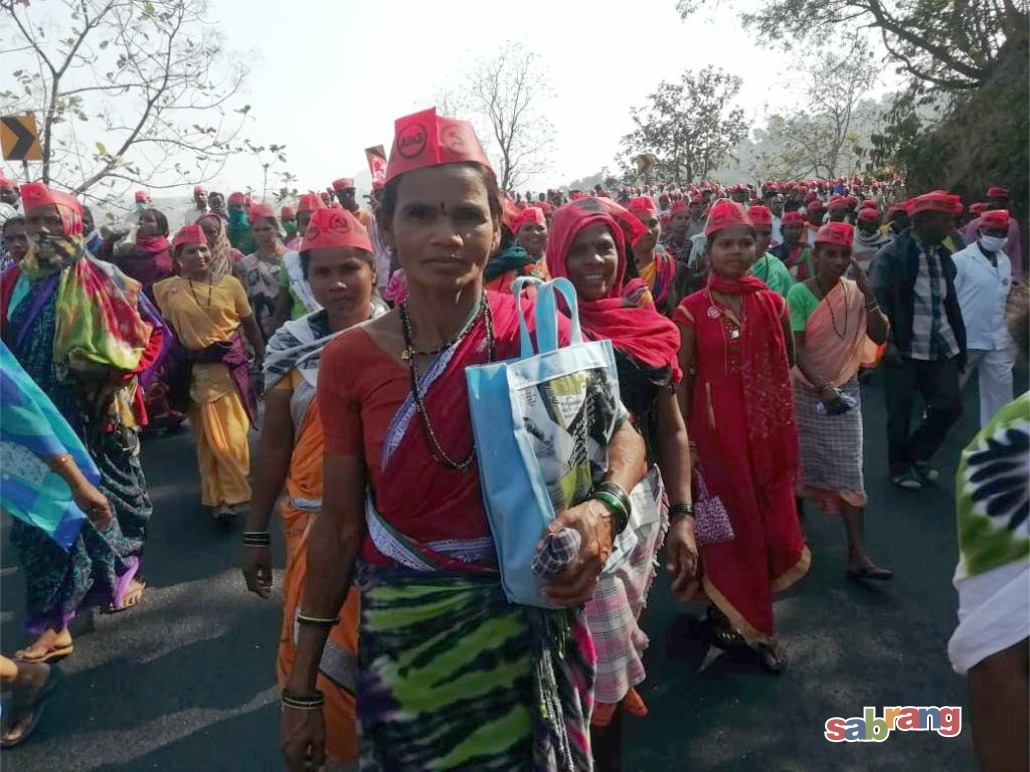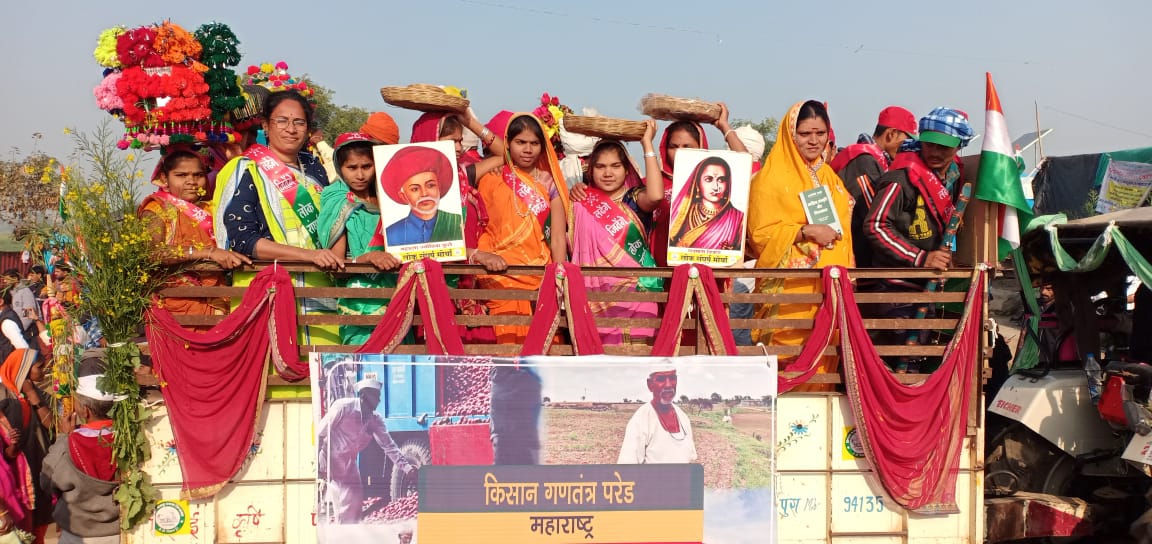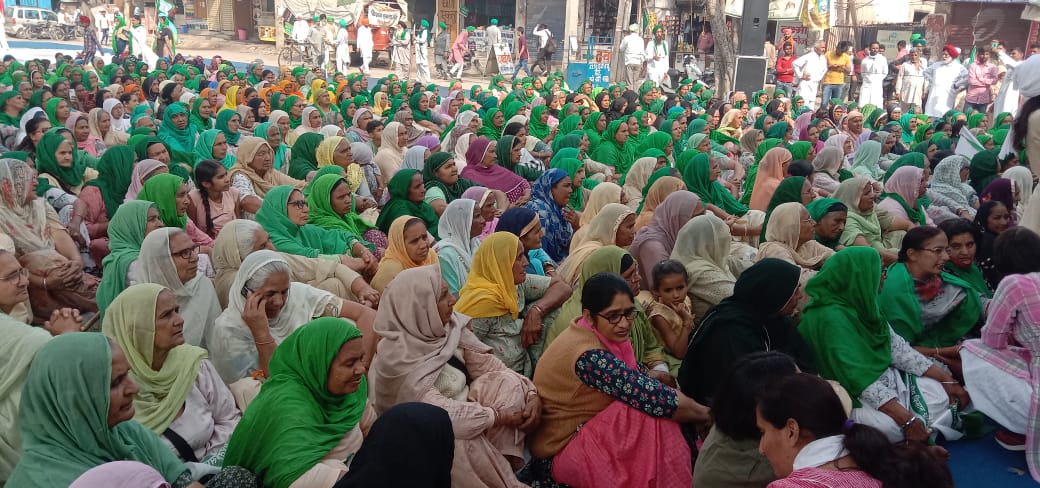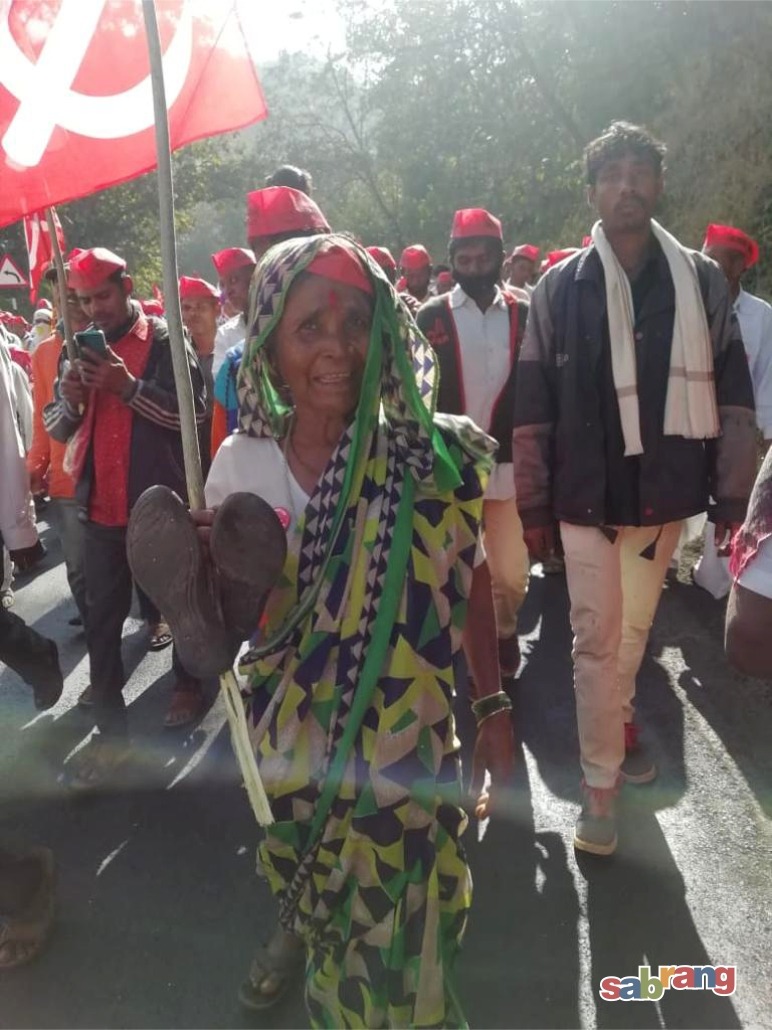
Even a day before Mahila Kisan Diwas on March 8, 2021, Adivasi (indigenous) women farmers in Palghar district of Maharashtra had begun awareness meetings to talk about the dangers of the three farm laws forcibly passed by the central government.
“Despite mass movement of Adivasi farmers in recent months, we still need to have such meetings with local women farmers to prepare them against the danger of such laws. If the laws allow the agricultural sector to become privatised, we fear it will take us back to the feudal system where we were enslaved for labour,” Palghar Adivasi farmer leader Savita Bavre told SabrangIndia during the programme.
This is a particular cause for concern for Adivasi women, who even after breaking free from the feudal system, continue to suffer certain patriarchal and capitalist norms in the agrarian sector.

Adivasi women in agriculture
According to the Unfree Mobility: Adivasi Women’s Migration report by the Centre for Women’s Development Studies in 2013, a larger proportion of tribal women have shifted to mobile forms of labour, owing to the lack of traditional restrictions on women’s work and labour in community practices and cultures.
However, it also stated that that higher tendency for labour migration among Adivasi women has not fundamentally altered their historical disadvantage in the agrarian economy. In fact, author Indrani Mazumdar said that it integrated Adivasi women in the developing labour market under capitalist development at several levels of additional disadvantage.
While British administrative systems ended Adivasi society’s isolation and political autonomy, their women’s labour migration in the post-independence days served a wider range of classes, like individual cultivating farmers (medium and large) or organised agro-industrial capitalists. Over the years, this has further widened the class differentiation in Indian society.

Issues faced by Adivasi women farmers
During a phone interview, Professor R. Ramakumar of the Tata Institute for Social Sciences (TISS) Centre for Study of Developing Economies, pointed out that there was no clear data regarding women Adivasi farmers’ contribution in the agri-sector.
“However, what is very clear is that given their size of holding and the absence of large-scale use of hired labour in the adivasi cultivation system, there is more of family labour used in holdings of Adivasi farmers. And whenever there is more use of family labour, women very clearly end up playing a higher role in the cultivation process,” he said.
Elaborating further, he said that their workload included sowing harvesting, drying of crops, all of which involves considerable physical labour and drudgery.
However, there is no escape for women and girls from such heavy labour, said Savita Bavre. She said that nowadays girls around the age of seven years begin cutting and sowing in the field. They do not get rest even when their menstruation begins, because men do not know how to do this work that is conventionally carried out by women.
Carrying out such labour is harder in monsoon but women are unable to say anything because neither the families, nor the local dispensaries offer any relief, said Bavre. “I have to do the housework and the field work. I can’t talk to my husband about this. We Adivasi women are farmers but we are unable to assert ourselves,” she said.
Another issue brought up by the farmer leader was the recognition of women farmers as ‘land owners.’ In a patriarchal society, women are not considered owners of land, socially or legally. Bavre said that land ownership often goes to the husband or to the son who has legally become an adult. Only in the case of a widow with an underage son, is the title given to the woman.
“In areas like Palghar, only women stay in the village and work. So, we think that this land is ours. By now, people should acknowledge this,” she said.

Inaccessibility to policies
The Adivasi leader also talked about how the lack of ‘owner’ title results in an inability to avail government schemes. For example, the PM-KISAN scheme that boasts 11.70 crore beneficiaries up to March 2021 provides an annual income of Rs. 6,000 in three equal instalments to small and marginal farmer families with a combined land holding of up to two hectares.
However, this money goes to the owner of the land, the patriarch of the household. A cursory glance at the beneficiary list provided on the government website shows that while there are many women beneficiaries, the gendered proportion of beneficiaries is largely disproportionate to the gendered distribution of labour in agriculture; female employment in agriculture is around 53 percent.
“Whenever policies are formed, the specific needs of women get side-lined,” said Prof. Ramakumar and illustrated his point by talking about the data on farmers’ suicide. He said that many women farmers do die by suicide as well. But such incidents are not considered farmers suicide because legally they are not farmland owners. As a result, families do not receive compensation for their deaths.
In 2014, The More Things Change: The World Bank, Tata and Enduring Abuses on India’s Tea Plantations report by the Columbia Law School Human Rights Institute, explained how dependents of women employees in Assam often failed to gain access to benefits. This happened despite the Plantations Labour Act detailing a clear non-gendered definition of ‘spouse’. Amendments in 2010 ensured that dependent parents were also included in ‘family’ regardless of worker’s gender. Yet, plantations like the Amalgamated Plantations Private Limited (APPL) systematically excluded all dependents of women workers from access to benefits. Many of these workers were from indigenous communities.
Medical expenses of husbands working as temporary labour were deducted from their wives’ pay cheques. However, instead of an itemised bill, women were informed verbally or through scraps of paper about the amount of money deducted from their wages. Meanwhile, management officials avoided such issues citing industrial practices.
In Borjan district, a Welfare Officer and plantation doctor openly mocked the idea of a man receiving free health care as a dependent of his female spouse because “the husband should work” and take care of his own needs.
Such conditions highlight the skewed manner in which policies for Adivasi women are implemented.
Adivasi women farmers and the three farm laws
Experts say that the three laws – the Farmers (Empowerment and Protection) Agreement on Price Assurance & Farm Services Act, the Farmer’s Produce Trade and Commerce (Promotion and Facilitation) Act, and the Essential Commodities (Amendment) Act – may only have an indirect effect of Adivasi farmers. The reasoning being that those farmers do not have a strong relationship to the mandi system.
However, Adivasi farm leaders worry that the laws will violate the rights and special guarantees of Scheduled Tribes (ST) and other traditional forest dwelling (OTFD) communities in the Fifth Schedule and tribal areas under Panchayats (Extension to Scheduled Areas) Act, 1996 (PESA), and the Forest Rights Act, 2006 (FRA).
Specifically, for Adivasi farmers, these laws dilute the powers of Gram Sabhas, dismantle their control over power reduction schemes, reduce their influence in local markets, and exclude local leaders’ roles in dispute resolution. All these powers are given to Gram Sabhas under the PESA. While the laws violate the FRA by threatening tenurial security, restricting use of common land and exposing particularly vulnerable tribal groups (PVTG) to agribusiness elements.
Bavre pointed out that privatisation in agriculture will also force farmers to grow crops demanded by corporates citing Haryana’s potato farmers as an example. She further added that this would eventually add more burden on women farmers who work in the field.
Further, Ramakumar said that even though there is no legal barrier to the private sector opening a market for Adivasis, corporates have not shown an interest until now.
“It does not exist today but tomorrow it is very much possible that private sectors will move into Adivasi cultivation areas also and start contract farming and then if you do not have good regulations in place these companies will start exploiting these farmers for sure,” he said.
Thus, central and state governments need to step in and create markets for Adivasi farmers with good regulations to prevent the exploitation of Adivasi farmers. When asked how conditions of women Adivasi farmers could be improved, Ramakumar said that special attention must be given to joint land ownership, government support cultivation and technology, proper crop prices and a stable market while effectively implementing provisions of the FRA.
The professor said that the government provides and forgets about the land given to Adivasi farmers. However, they need more support cultivating and using better technological implements.
“Sometimes they receive five acres and farmers don’t know what to do with it. So supplementary support for cultivation and technology is required… All this will go a long way in helping Adivasi farmers and particularly women Adivasi farmers,” said Ramakumar.
Building on this, Bavre also appealed to the administration to consider the health of women Adivasi farmers while formulating schemes and policies.
On March 8, women farmers across India will head towards protest sites in a show of strength. Farmer leaders foresee large mobilisation across the country, as women from various social classes come together.
Related:
Women Famers still struggling for recognition
100 days of farmers’ struggle: Agitation evolves and grows stronger
AIKS celebrates third anniversary of Kisan Long March
Delhi Police allegedly detain 25 women and a toddler
Karnataka farmers ask: Where is MSP Modi ji?
India’s farmers and workers to commemorate Anti-Privatisation Day on March 15
Nodeep Kaur case: NHRC seeks report from Haryana Police over alleged custodial torture
IT raids, govt’s desperate attempt to attack farmer supporters: SKM
Farmers focus on assembly election stating “govt only understands votes”
